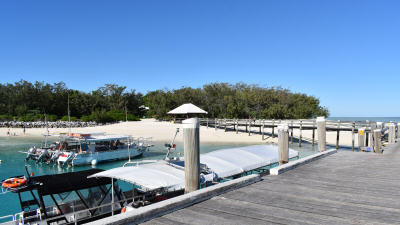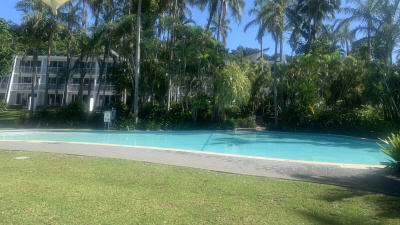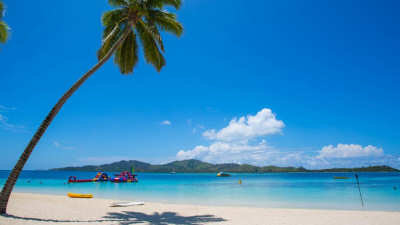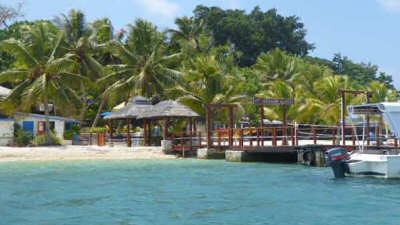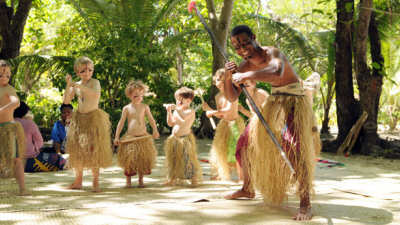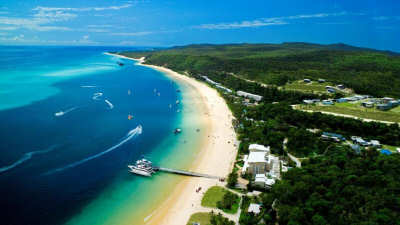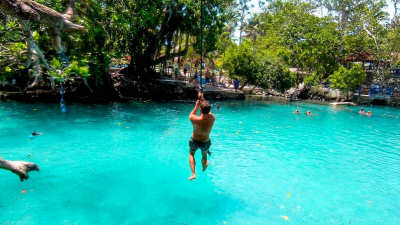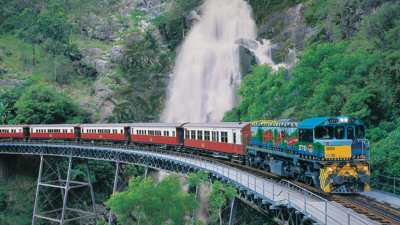Luggage Restrictions
To increase your safety, there are new rules for taking liquids, aerosols and gels on flights into and out of Australia.
Each container of liquids, aerosols or gels in your carry-on baggage must be 100 millilitres or less. All the containers must be sealed in a transparent, one-litre plastic bag. You are only allowed one plastic bag. Any transparent resealable bag of one litre capacity or less is allowed.
You may still carry on board prescription medicines. Baby products and non-prescription medicines that you need for the flight are also allowed. Proof of need may be required.
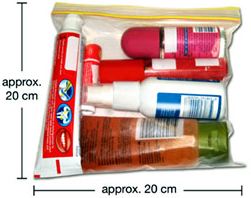
For more information visit the
Australian Government travel security website.
Travelling to the UK or USA? New luggage restrictions are now in place.
UK Restrictions |
US Restrictions
What To Take
No matter how thorough you are you will always tend to forget something. The following items are not a complete list of everything you need to take, but you may find it helpful to use as a starting point.
It's a good idea to put together a kit of medical supplies, especially if you travel frequently or are travelling to destinations where the local chemist is hundreds of kilometers away. Some things you take for granted at home may not be available elsewhere. When selecting items for your kit, check expiry dates and try to pick items that don't need to be replaced for a few years. A good starting point could be an off the shelf medical kit, but a soft toiletries bag filled with some (or all) of these items will suffice.
|
Medicines
|
Items |
Australian and New Zealand School Terms
Australian school terms
New Zealand school terms
Travel Agents
Don't take the first quote you get, unless you sure it's reasonable. Shop around a few different agents and you'll be surprised at the difference in the quotes. Some agents get better deals at different resorts so may be able to offer you a cheaper deal. You can even book your holiday through the resort directly by visiting their web page. But this is not always the cheapest alternative. Some travel agents organise deals with the resorts and can provide a much better price. Look in the travel sections of papers for the cheap holiday offers, as these are usually subsidised and generally as cheap as you can get. Do your sums, but don't forget to add transfers and departure taxes etc.
Make sure you take out travel insurance. It will probably only add as little as $100 to your holiday and could save you a lot of money and hassles.
Check with your travel agent about room upgrades and special meal deals as these may not be able to be purchased once you reach your destination.
If you require special meals on the flight for yourself or your children, get your travel agent to arrange it, and make sure you confirm it with your airline a couple of days before you leave.
An Australian site that specialises in travel brochures provides a good way to order your preferred brochures and have them delivered to your door - free of charge. You can check the site at
www.travelbrochures.com.au
Airlines
A great deal depends on your holiday destination as to how much you'll be paying for your airfares and how successful you'll be securing seats during the peak times. As a general rule, if there is more than one airline carrier that can get you to your destination, the more likely your are of getting a good deal year round.
Fiji: For Australians there is a choice of either
Fiji Airways or
Virgin Australia.
There is still a high demand for flights during the school holidays
so you need to book early. For the rest of the year, prices are cheaper
and seats easier to book so it may be a case of giving the kids an extra week off school to be able to afford the trip. The period after the Christmas holidays and before Easter seems to be the cheapest, with the winter months fractionally dearer.
Vanuatu: A choice between
Air Vanuatu and
Virgin Australia with the same deal as for Fiji. Airfares to Vanuatu are generally a bit cheaper than to Fiji.
Cook Islands: Air New Zealand or
Virgin Australia.
You will also pay more during peak periods. Generally the airfares
to the Cook Islands are more expensive than Fiji or Vanuatu, but
mainly because its a 7 hour trip from Australia, with a stopover in
Auckland (for both carriers).
Queensland: Qantas,
Jetstar and
Virgin Australia
to choose from, making the airfares cheap year round for
destinations like Brisbane and the Gold Coast. All you need to do is
get in early for the peak periods.
Bali: Again with a choice of carriers the airfares are reasonably uniformly priced year round. Expect to pay a little more during the winter months and Christmas.
The Flight
Most of the destinations covered in this web site are reasonably close to Australia and New Zealand. From experience, young children are happy for a couple of hours on a plane, then they start to get a bit restless. Most airlines will provide the kids with a colouring or activity set which will keep them amused for a while. Consider packing some colour books and pencils, reading books etc. On board movies generally aren't interesting for the kids so that may not hold their attention. Let them wander around the plane for a while, as long as they aren't upsetting other passengers. Game boys and laptop computers will probably do the trick but check with your airline of there OK to use - you certainly can't turn them on during takeoff or landing.
Some children (and adults) suffer ear pain during the aircrafts descent (especially if they have a cold). It is best not to fly if you have a cold or hayfever, but often you don't have a choice. The following suggestions, while certainly not guaranteed, may be of some help: take some chewy lollies with you and ask the airline staff for some eucalyptus to inhale, which eases the pain; nasal decongestants and/or antihistamines prior to the flight and maybe a nasal spray prior to descent; a product call Earplanes reputedly regulates the air pressure - you can find out more at
www.cirrushealthcare.com
If you are arriving at a warmer destination late at night or early morning it may not be possible to get drinks (at least until you've cleared customs). Consider buying some bottled water before you leave and store it in your cabin baggage
(this may be subject to new baggage restrictions). Its also a good
idea to pack some bottles of water in your main luggage, especially
if you arrive at your destination late at night and you're not sure
if its safe to drink the local water.
Money
The easiest method is to pay for everything on your credit card, but if you're traveling to another country there will be certain things that you cannot use the card for like bus and taxi fares and dining outside resorts etc.
Take some travelers cheques. They are safe and easy to cash, and you can always cash them in when you get home if you don't use them. You will probably need some foreign cash before you arrive at your destination. You can change money at the airport, but generally the exchange rate is not good, so shop around before you leave. While you're overseas, change your travelers cheques at banks rather than resorts for a better rate.You will find that many hotels will restrict the amount (usually $100) of travellers cheques you can cash in a day. If you can't get to a bank this restriction may not allow you
to use cash for everything so its always a good idea to use both credit cards and cash for purchases.
Check if you need to pay a departure tax when leaving your destination. You usually can only pay in local currency, so put some cash away.
Try to prepay as much as possible (meals, transfers etc) so you know what you're likely to spend.
Weather
Check the weather before you go. It's good to know what the maximum and minimum temperatures are going to be while you are away and if rain is expected.
The Weather.com site offers a ten day forecast for all major countries in the Australia/Pacific/SE Asia region showing expected conditions, maximum and minimum temperatures, wind speed and humidity.
Satellite images are included.
Passports
Australia: You can apply for a passport at any Australian State Passport Office or at most Australia Post Offices. You will need to fill in an Australian Passport Application and obtain 2 colour photographs as well as show proof of identity.
Check out the Australian Passports web page for further information and costs.
New Zealand: A passport application form needs to be filled out, as well as supplying two photographs, proof of NZ citizenship and proof of identity.
Check out the New Zealand Passports web page for further information and costs.
Customs And Duty Free
Australia
Duty free shopping has changed in Australia since the introduction of the Goods and Services Tax (GST). You can now make your purchases from any retail store and claim the GST component back when you travel. There are a few conditions (see below) but the basic benefit is that you don't have to pay the already inflated prices offered by the duty free stores and you can use your purchase prior to departure. You can purchase your camera or video camera etc from an electrical store and claim the GST.
The tourist refund scheme (TRS) enables Australian residents to claim the GST component of purchases. However there are a few conditions you should be aware of:
- it only applies to goods you take with you as hand luggage or wear onto the aircraft or ship.
- it will be only paid on goods costing $300 or more and brought from the same store. You can purchase goods on separate occasions from the one store but you must get one tax invoice from the store to claim the refund. You can't total goods purchased from different stores.
These goods can be used prior to departure, as distinct from normal duty free purchases which are sealed until you pass through customs. Items like tobacco and alcohol are not included in the TRS.
For more details on the TRS check with the
Australian Customs Service. Your duty free allowance when returning to Australia includes $900 worth of goods (not including tobacco or alcohol),
2250ml of alcoholic liquor, 250 cigarettes or 250 grams of cigars or tobacco products and most personal items. Goods purchased overseas or goods brought duty free before leaving Australia are included.
Make sure you declare any goods that you bring back into the country. Keep your purchases like wooden articles, shells etc in your carry on luggage for a quick inspection.
For more details check the
Australian Customs Service web site.
New Zealand
Your duty free allowance when returning to New Zealand includes $700 worth of goods. 1125ml of alcoholic liquor and 4.5 litres of wine or beer, 200 cigarettes or 250 grams of cigars or tobacco products and most personal items. Goods purchased overseas or goods brought duty free before leaving New Zealand are included.
For more details check the
New Zealand Customs Service web site.



